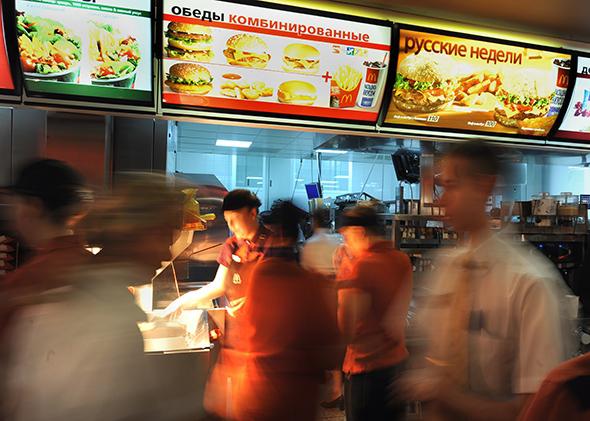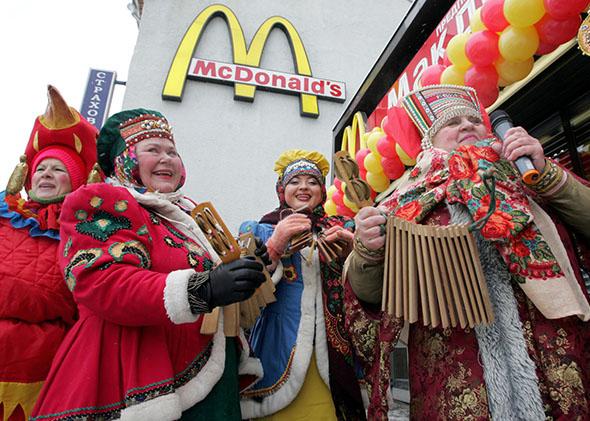While it lasted, globalization was a beguiling tale we told ourselves about the future. The world is interconnected and therefore getting not just richer but more peaceful all the time. The technologies of international capitalism—outsourcing, insourcing, offshoring—would not only make the world’s businesses more profitable, but they would make all the people less quarrelsome. We would play chess online with Indians, and thus become more like them. We would buy software from China, and thus never go to war with them. Even better, once they started trading, India and China would never go to war with each other either.
At the height of this optimism, the “McDonald’s theory of international relations” was a thing one heard about quite frequently. The idea was that no country with a McDonald’s restaurant would ever go to war with another country with a McDonald’s restaurant, because in order to have a McDonald’s, you had to be thoroughly integrated into the global economy, and if you were integrated into the global economy, you would never attack another one of its other members. This theory of “McPeace” was exploded, literally, by the American bombardment of Belgrade, the city that in 1988 had opened the very first McDonald’s in the whole ex-Communist bloc. But the hope that it might be true somehow lingered on.
This week, as Russia, a country with 433 McDonald’s, ramps up its attack on Ukraine, a country with 77 McDonald’s, I think we can finally now declare the McPeace theory officially null and void. Indeed, the future of McDonald’s in Russia, which once seemed so bright—remember the long lines in Moscow for Big Macs?—has itself grown dim. In July, the Russian consumer protection agency sued McDonald’s for supposedly violating health regulations. This same consumer protection agency also banned Georgian wine and mineral water “for sanitary reasons” at the time of the 2008 Russian-Georgian war, and it periodically lashes out at Lithuanian cheese, Polish meat, and other politically unacceptable products as well.

Photo by Alexander Nemenov/AFP/Getty Images
Perhaps we should have paid more attention to these politically motivated trade boycotts, for it turns out they were only a harbinger of what was to come. If we didn’t, perhaps that was because the tale of globalization promised more than just eternal McPeace. It also offered a reassuring promise of irreversibility. For the better part of two decades, we have taken for granted the assumption that globalization is a new stage in world history, not a passing phase. Surely the binding ties of trade would last forever because they were mutually advantageous. No country that had seriously begun to play this “win-win” game would ever be able to abandon it, because the political costs of doing so would be too high. Trade wars were meant to be a thing of the past.
This week—as Russia bans most American, European, Canadian, Australian, and Japanese agricultural goods—globalization suddenly began to unravel a lot faster than anybody imagined. Vladimir Putin knew sanctions were coming and openly declared that he didn’t care. He also knows that a trade war will hurt a wide range of his countrymen, but he didn’t mind that either. Western sanctions on Russia were deliberately designed to target a small number of people in the financial and energy sectors. Russia’s food sanctions will hit a lot of large and small companies, mostly in Europe, but they will also affect almost everyone in Russia. Right now, Russia imports at least a quarter and possibly as much as half of its food, not only Camembert from France but frozen peas from Poland. Imports have both increased consumer choice and lowered prices for ordinary Russians. Now choice will shrink, and prices will rise.
In other words, a large country that contains internationally traded companies has just decided that it prefers a territorial war with one of its neighbors to full membership in the international economic system. A large country that contains plenty of people educated in global economics has also decided it can accept higher food prices in the name of national honor. It is not only possible to reject the “win-win” mantra of globalization in favor of different values and another sort of politics—it is happening right now. And if it can happen in Russia, it can happen elsewhere, too.
